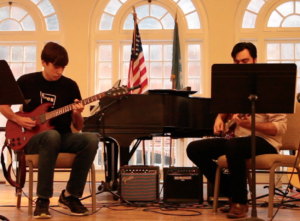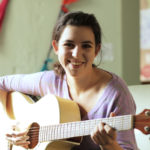Preparing for Your First Recital
 It’s recital season! For many students, that means it’ll be their first time performing in front of other people. Not only is it exciting, it’s a good learning opportunity. Your teacher will help you with the specifics of your situation. Still, there are a couple of universal things you may want to know ahead of time when preparing for your first recital.
It’s recital season! For many students, that means it’ll be their first time performing in front of other people. Not only is it exciting, it’s a good learning opportunity. Your teacher will help you with the specifics of your situation. Still, there are a couple of universal things you may want to know ahead of time when preparing for your first recital.
Choose a Song and Practice Smart
Many students make the mistake of choosing a song they think will be popular or extra showy for their first recital. While there’s nothing wrong with choosing a popular or showy song, the point of a recital is to showcase what you have learned in your lessons so far. Choosing a song you’ve already been working on will serve you well. You’ll also want to make sure your song is challenging, but within your skill set. Remember, the recital first and foremost is for your development.
When you’re practicing, remember: up until now you’ve been able to give in to the luxury of stopping and starting in the middle of the song to play every note just right. We don’t have this option in performance though. Make sure you practice the spots that you have to stop and start at, then run through your song without stopping no matter what happens. Chances are you’ll run into less problems than you think. But even if something happens, the odds of the audience catching your mistakes are not as high as you think they are. So, if you keep going and act like your mix ups were intentional, your audience will be none the wiser.
Space, Equipment, and Accompaniment
Most studio recitals take place somewhere else other than your regular lesson room, and that’s a good thing! You learn better by performing in spaces unfamiliar to you. That means you’ll need to practice accordingly though. Try practicing in different rooms, or manipulating how well you hear yourself play by using earplugs or amplification (if possible). This will help your ears adjust to unfamiliar surroundings.
You will probably also have a microphone for the performance. If it’s not possible for you to practice with a microphone beforehand, practice with it in mind. Ask your teacher where you’ll want to place the microphone. Then, use household objects to mimic its placement so you can learn to play into it.
Finally, not every music student will use accompaniment (either through a pianist or a recorded backing track) for their first performance. However, if you plan to use it, be sure to practice with it at least a month before the performance. Coordinating your playing with another musician is a skill unto itself, and it should be treated as such.
Calm the Nerves
You may or may not experience stage fright (also known as performance anxiety), and if you’ve never performed live before, you may not even know if you have it. Know that a little anxiety before a performance is normal, and maybe even helpful. If you’re worried about excessive anxiety though, create a mock performance for yourself by playing in front of family and friends. You can also use deep breathing techniques to center yourself before playing.
The more prepared you feel, the better you’ll feel about your performance. Preparing for your first recital, in short, entails knowing your music so well and feeling so comfortable that no matter what happens, all you have to do is get on stage and share the joy of music with your loved ones.

